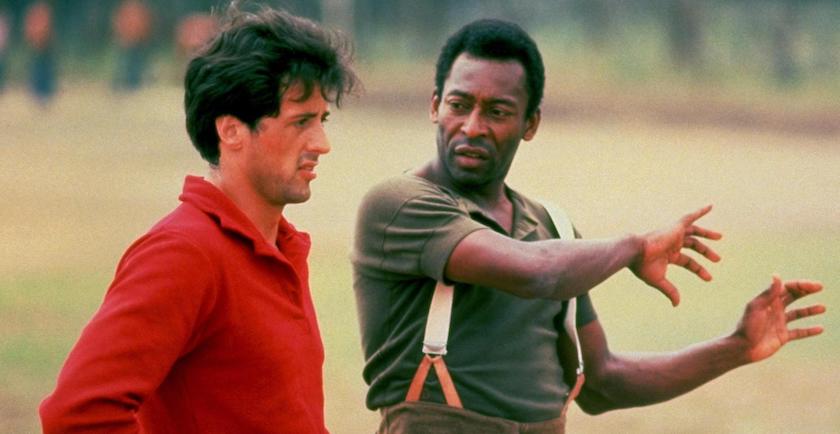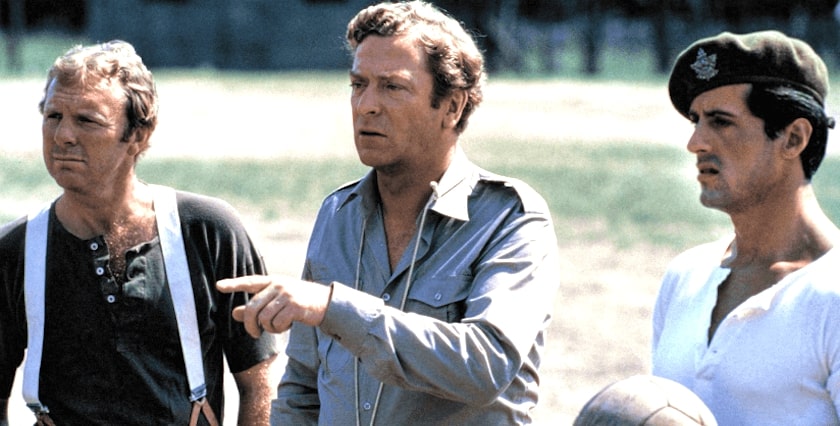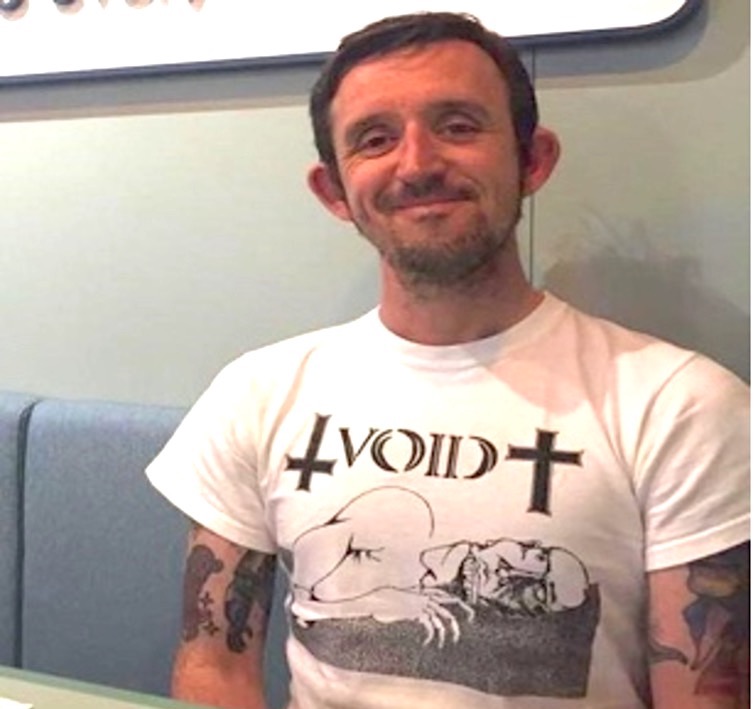
[This is a repost of our 2018 article]
Escape to Victory (or simply Victory if you are more familiar with the prosaic US and Australian title) is a 1981 World War II / sports movie meld from legendary director John Huston, known for classics such as The Treasure of the Sierra Madre and The African Queen. To put it another way: Escape To Victory is the greatest sports movie ever made.
Loosely based on a 1962 Hungarian film by the name of Two Half-Times in Hell (Két félidö a pokolban), aka The Last Goal, the story has its roots in a remarkable real-life series of football matches known as The Game of Death, aka The Death Match, which took place in 1941 and saw F.C. Dynamo Kiev trounce a team of Nazis.
But let historical accuracy be damned, because Huston’s rollicking adventure has a team sheet that lines up like Fantasy Football. We’ve got Michael Caine and Max Von Sydow representing the actors, with real-life football legends Bobby Moore, Pele and Ossie Ardiles among the big names for the players. Rounding things off, our dream team is complete with Sylvester Stallone lining up on the field and plotting an escape plan off it.
The movie begins with John Colby (Caine), a former professional footballer for West Ham United who is now serving out the war in an Allied P.O.W. camp. He meets Major Karl Von Steiner (Von Sydow), who recognises him and suggests a match between a team of POWs assembled by Colby, and a team comprised of the Wehrmacht. Colby agrees on the condition of better rations and decent gear. Before long, the match has become a propaganda tool for the Nazis, taking on a life of its own and being moved to a large stadium in Paris.
During the course of the set up and training, Canadian Robert Hatch (Stallone) is plotting an escape with the help of the prison’s resistance commanders. They seize the opportunity to combine the match against the Nazis with a daring escape plan that would get the entire team to safety.
Escape to Victory is great. It works as an escape caper and as the greatest football movie ever made. Sure, it’s a little predictable, and a tad on the far-fetched side of things, but for pure vicarious thrill and enjoyment, it takes some beating.
Escape to Victory also stands up as a war movie. Despite its light approach, it does not shy away nor make light of the darker aspects of the conflict. When picking his team. Colby asks for Eastern European players he knows. Von Steiner explains that they do not exist in the eyes of the Nazis, so when Colby eventually gets his way, the players turn up haunted and skeletal from their time in the labour camps. This means the Allies can’t quit the match even if they want to, because their teammates will be returned to face certain death.

In terms of the cast, there are no weak links – even from the footballers. Caine turns in a classic London wide-boy performance, bringing his Charlie Croker from The Italian Job to mind. Colby objects to the upper class officers in the camp who want the team to escape; his lads have done their job as far as he is concerned. He doesn’t want to get them killed, so he approaches the game legitimately – as a distraction from prison life.
Stallone is classically movie Stallone: all strutting, with know-it-all overconfidence and, frequently, a bit of a prick. But at other times, he could almost be a time-warped Rocky Balboa, demanding you like him and getting by on his charm.
Pele, Moore and Ardiles acquit themselves surprisingly well, believable as both players and prisoners. Their acting works in the context of an international group of players trying to form a team, and their skill on the pitch is plainly evident despite the choreography.
The rest of the teams are made up of assorted players from the Ipswich Town side that won the FA Cup and UEFA cup under the stewardship of future England manager Bobby Robson, including John Wark and Russell Osman, who gets to utter the immortal, quotable half-time line: “Let’s go back… we can win this!”
Von Sydow lends his impeccable skills to the role of Von Steiner, a philosophical man who cares more about the football than Nazi ideology. He’s constantly giving off the impression he doesn’t want to be there, and accommodates all of Colby’s requests. Von Sydow is a brilliant, nuanced actor, but he, like everyone else involved, never gives the impression the movie is beneath him, and so the whole thing gels perfectly because everyone commits to it.
Escape To Victory is a large slice of nostalgia for pretty much any football-loving English kid who grew up during the 1980s, as married to our childhood filmography as Star Wars or anything Disney could conjure up. The match itself is absurd – full of robust Nazi tackles, outlandish moves and silky skills from the cultured Allied players. There’s even an English-voiced Lord Haw-Haw styled radio commentator. Yet, the game is deliriously exciting and utterly memorable. I’ve tried to emulate Ardiles’ slow-motion overhead flick in every park game I’ve participated in since.
As the latest World Cup unfolds, fans should do themselves a favour and revisit the greatest game of all time, when a plucky side of underdogs took on the might of the Nazi war machine — and Sylvester Stallone played in goal.










